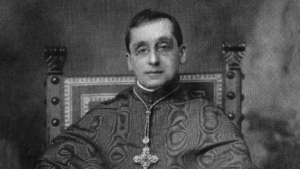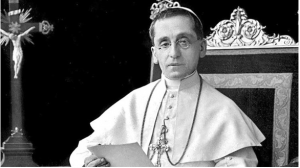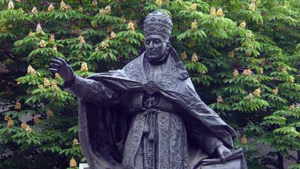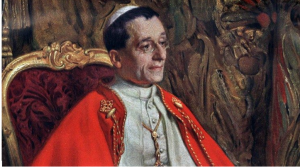ONE HUNDRED YEARS AGO BENEDICT XV DIED, A POPE AT THE SERVICE OF PEACE
The pontificate of Giacomo Della Chiesa was marked by calls for an end to the "useless massacre", the First World War. But it is also remembered for the promulgation of the new Code of Canon Law and the cancellation of the "non expedit" which, following the decree of September 10, 1874, forbade Catholics to participate in political life.
In 1854, Genoa was shaken by a terrible cholera epidemic. Giacomo Della Chiesa was born on November 21, the third of four children. He was the third of four children and came from a family of counts, although not very rich. The newborn was baptized in the parish church of Nostra Signora delle Vigne.
A rapid ascent
At the age of fifteen, Giacomo expressed his desire to become a priest. But under pressure from his father, he first enrolled in law school. After graduating, he entered the Capranica College in Rome and was ordained a priest on December 21, 1878. He was then admitted to the Pontifical Academy for Noble Ecclesiastics, where young men from patrician families were prepared for the diplomatic service of the Holy See. In 1883, he left for Madrid as secretary to the Apostolic Nuncio, Monsignor Mariano Rampolla del Tindaro. Consecrated a bishop by Pius X in the Sistine Chapel on December 22, 1907, Archbishop Della Chiesa was then appointed Archbishop of Bologna. On May 25, 1914, he was created a cardinal. Three months later, on August 20, Pope Pius X died, during a tormented summer: on July 28, Austria-Hungary declared war on Serbia, marking the beginning of the First World War.
Faced with the horror of war
During the conclave, which met on August 31, 1914, Cardinal Giacomo Della Chiesa, who had been elevated to the cardinal's crown only three months earlier, was elected pope and took the name of Benedict XV. From the beginning of his pontificate, he expressed his sorrow at the tragedy of the war: in the apostolic exhortation Ubi primum of September 8, he exhorted "those who govern the destiny of peoples to put aside all their quarrels in the interest of human society. When "we turned our gaze to the whole flock of the Lord entrusted to our care," the Successor of Peter continues, "the terrible spectacle of this war immediately filled our souls with horror and bitterness, seeing that so much of Europe, ravaged by iron and fire, was soaked with the blood of Christians. The tragedy of war is also evoked in his first encyclical, Ad beatissimi apostolorum. Every day," the Pontiff notes, "the earth is reddened with new blood and covered with the dead and wounded.

Cardinal Giacomo Della Chiesa, future Benedict XV
To stop a
Benedict XV's many appeals for peace unfortunately went unheeded. On May 24, 1915, Italy, which had been neutral for almost a year, entered the war. The next day, writing to Cardinal Serafino Vannutelli, dean of the Sacred College, Benedict XV expressed his concern: "War continues to stain Europe with blood, and it is not even on land or sea that means of infringement contrary to the laws of humanity and international law are avoided. And as if this were not enough, the terrible fire has also spread to our beloved Italy, making us unfortunately fear for her too that succession of tears and disasters which usually accompanies every war". On July 28, 1915, on the first anniversary of the beginning of the war, the Pope addressed an exhortation to all the belligerent peoples to end the conflict. A horrible carnage, he wrote, "has disgraced Europe for a year", "it is fraternal blood that flows on land and sea". In 1916, before the Sacred College of Cardinals, he again invoked "that just and lasting peace which must put an end to the horrors of war". But the conflict continued, and on August 1, 1917, he sent "to the leaders of the belligerent peoples" a letter in which he asked them to put an end to what he called a "useless massacre. Reflect," Benedict XV demands, "on your most serious responsibility before God and mankind.
The dawn of reconciliation
The pontificate of the Genoese Pope was also marked by important decisions for the life of the Church. With the Bull Providentissima Mater of May 27, 1917, Benedict XV promulgated the new Code of Canon Law, already requested by the First Vatican Council and desired by Pius X. With the Motu Proprio Dei Providentis of May 1, 1917, he established the Sacred Congregation for the Eastern Church.
The end of the war, which the Holy Father had tirelessly called for, finally arrived in 1918. Benedict XV began his encyclical letter Quod iam diu of December 1, 1918 with these words: "The day that the whole world has been anxiously awaiting for so long, that Christianity
The whole world has implored with so many fervent prayers, and that we, the interpreters of the common pain, have unceasingly invoked for the good of all, here is that it has happened in an instant: the weapons have finally been silenced". In 1919, the International Peace Conference opened in Paris. In view of this meeting, the Pope invites in the encyclical Quod iam diu to decisions based on Christian principles. Catholics, "who must by conscience favor civil order and progress, have the duty to invoke the Lord's wise assistance on those who will participate in the Peace Conference," he said.
On May 13, 1917, Benedict XV consecrated Eugenio Pacelli as a bishop, and in 1939, he ascended the throne of Peter as Pius XII. The two Pontiffs, less than thirty years apart, tried to avoid the drama of a world war by repeated prayers and appeals for peace, but they were not heard.
A fragile peace
After the end of the First World War, Benedict XV reacted to the rancor that divided the peoples. In his encyclical Pacem, Dei munus of May 23, 1920, he recognized that peace had begun "to shine upon the peoples". "Nevertheless, the seeds of ancient enmities remain," he noted. No peace can be consolidated if "hatreds and grudges are not appeased by a reconciliation based on mutual charity". On January 24, 1921, he recalls that Austria "struggles against the horrors of misery and despair". As for the Russian people, they were suffering from hunger and epidemics. In his letter of August 5, 1921, Benedict XV's concern is perceptible: "From the basin of the Volga, many millions of men invoke, in the face of the most terrible death, the help of humanity," he writes.

Benedict XV with one of his many writings
To Italian Catholics
In Italy, where the disagreements between the State and the Holy See after the events of 1870 continued, the political groups were also in conflict. Wishing to mitigate these conflicts, Benedict XV addressed the diocesan councils of Italy on March 3, 1919, and cancelled the "non expedit" which, following the decree of September 10, 1874, prohibited Catholics from taking part in elections and in the political life of the newly reunited peninsula. This decision anticipated the Lateran Concordat that was signed on February 11, 1929. Reconciliation between peoples emerged as a constant concern of Benedict XV. On July 25, 1921, he invited the Italians to recite the prayer "O God of Goodness", which he had composed, in which he invoked the Lord and the Virgin to promote national reconciliation and concord in the country. Suffering from broncho-pneumonia, he died on January 22, 1922.
A statue in Turkey
In the courtyard of the Cathedral of the Holy Spirit in Istanbul, there is a statue of Benedict XV, recalling his great commitment to peace. An inscription appears on the base: "To the great Pontiff of the tragic hour of the world Benedict XV, benefactor of the peoples without distinction of nationality or religion, as a sign of gratitude, the East (1914-1919)". From the archives of the Apostolic Delegation in Istanbul, now preserved in the Vatican archives, it emerges "that Benedict XV asked the papal delegate, Monsignor Angelo Maria Dolci, to intervene with the French army to ask it to treat the Turkish prisoners humanely and not to take revenge on them. He also had a hospital opened for these wounded soldiers.
On the occasion of the centenary of the death of Benedict XV, a mass and a congress are planned in his native city of Genoa. In Rome, a mass is also being celebrated in St. Peter's Basilica on January 22, in the presence of the Confraternity of Saint John the Baptist of Genoa.


